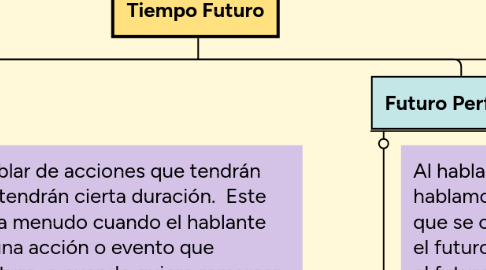
1. Futuro Simple
1.1. Las formas “will” y “going to” se utilizan para expresar el futuro. La diferencia entre ellos es el sentido de planificación y probabilidad de que suceda una acción.
1.1.1. "Will"
1.1.1.1. Structure (Estructura): - Affirmative Sentences (Frases afirmativas): Sujeto + “will” + verbo principal. Ejemplo: I will call you tonight. (Te llamaré esta noche.) - Negative Sentences (Frases negativas): Sujeto + “will” + “not” + verbo principal. Ejemplo: I will not call you tonight.(No te llamaré esta noche.) - Interrogative Sentences (Frases interrogativas): “Will” + sujeto + verbo principal+?. Ejemplo: Will you call me tonight? (¿Me llamarás esta noche?)
1.1.2. " Going to"
1.1.2.1. Structure (Estructura): “Going to” equivale a “ir a” en español. - Affirmative Sentences (Frases afirmativas): Sujeto + verbo auxiliar (to be) + “going to” + verbo principal. Ejemplo: I am going to call you tonight. (Voy a llamarte esta noche.) - Negative Sentences (Frases negativas): Sujeto + verbo auxiliar (to be) + “not” + “going to” + verbo principal. Ejemplo: I am not going to call you tonight. (No voy a llamarte esta noche.) - Interrogative Sentences (Frases interrogativas): Verbo auxiliar (to be) + sujeto + “going to” + verbo principal?. Ejemplo: Are you going to call me tonight?(¿Vas a llamarme esta noche?)
2. Futuro Continuo
2.1. Se utiliza para hablar de acciones que tendrán lugar en futuro y tendrán cierta duración. Este tiempo se utiliza a menudo cuando el hablante quiere enfatizar una acción o evento que sucederá en el futuro, o cuando quiere remarcar la diferencia entre lo que sucede en el momento de hablar y lo que sucederá en el futuro. Además, el futuro continuo se utiliza para expresar que algo estará sucediendo a la vez que otra acción, ambas en el futuro. En este sentido podemos decir que se comporta de forma similar al pasado continuo, pero para hablar de lo que sucederá en el futuro.
2.1.1. "Will"
2.1.1.1. Structure (Estructura) - Affirmative Sentences (Frases afirmativas): Sujeto + “will be” + verbo+ing… Ejemplo; I will be talking. (Estaré hablando.) - Negative Sentences (Frases negativas): Sujeto + “will” + “not” + “be” + verbo+ing… Ejemplo; I will not be talking. (No estaré hablando.) - Interrogative Sentences (Frases interrogativas): Verbo auxiliar “will” + sujeto + "be"+ verbo + ing…?. Ejemplo; Will you be talking? (¿Estarás hablando?)
2.1.2. "Going to"
2.1.2.1. Structure (Estructura) - Affirmative Sentences (Frases afirmativas): Sujeto + verbo auxiliar (to be) + “going to be” + verbo+ing… Ejemplo; I am going to be talking.(Estaré hablando.) - Negative Sentences (Frases negativas): Sujeto + verbo auxiliar (“to be”) + “not” + “going to be” + verbo+ing… Ejemplo; I am not going to be talking. (No estaré hablando.) - Interrogative Sentences (Frases interrogativas): Verbo auxiliar (“to be”) + sujeto + “going to be” + verbo+ing…?. Ejemplo: Are you going to be talking? (¿Estarás hablando?).
3. Futuro Perfecto
3.1. Al hablar del tiempo futuro perfecto, hablamos del pasado en el futuro, o lo que se consideraría como una acción en el futuro que es anterior a otra acción en el futuro. Ejemplo: I will have finished my work before 10 pm = Yo habré terminado mi trabajo antes de las 10 pm.
3.1.1. "Will"
3.1.1.1. Structure (Estructura) - Affirmative Sentences (Frases afirmativas): Sujeto + “will have” + participio pasado. Ejemplo: The party will have ended by the time you finish work. (La fiesta habrá terminado cuando termine el trabajo.) - Negative Sentences (Frases negativas): Sujeto + “will” + “not” + “have” + participio pasado. Ejemplo: The party won’t have ended by the time you finish work.(La fiesta no habrá terminado cuando termine el trabajo.) - Interrogative Sentences (Frases interrogativas): “Will” + sujeto + “have” + participio pasado?. Ejemplo: Will the party have ended before you finish work? (¿La fiesta habrá terminado antes de que termine el trabajo?)
3.1.2. "Going to"
3.1.2.1. Structure (Estructura) - Affirmative Sentences (Frases afirmativas): Sujeto + verbos auxiliar (to be) + “going to have” + participio pasado. Ejemplo: The party is going to have ended by the time you finish work. (La fiesta habrá terminado cuando termine el trabajo.) - Negative Sentences (Frases negativas): Sujeto + verbo auxiliar (to be) + “not” + “going to have” + participio pasado + ?. Ejemplo: The party isn’t going to have ended by the time you finish work. (La fiesta no habrá terminado cuando termine el trabajo.) - Interrogative Sentences (Frases interrogativas) Verbo auxiliar (to be) + sujeto + “going to have” + participio pasado + ?. Ejemplo: Is the party going to have ended before you finish work? (¿La fiesta habrá terminado antes de que termine el trabajo?)
4. Futuro Planificado
4.1. Se emplea para expresar acciones en un futuro planificado y, generalmente, próximo. Igualmente, se utiliza cuando existe la certeza de algo, cuando se tienen elementos suficientes que permiten predecir una determinada acción de futuro. Con esta forma verbal expresaremos acciones como las siguientes: Voy a comer patatas fritas/ Germán va a hacer los deberes.
4.1.1. Structure (Estructura) - Afirmative Sentences (Frases afirmativas): Sujeto + verbo to be (conjugado en presente) + going to + verbo . Ejemplo; I am going to buy a car (yo voy a comprar un coche) - Negative Sentences (Frases negativas): Sujeto + verbo to be en negativo (conjugado en presente) + going to + verbo. Ejemplo; I am not going to buy a car (yo no voy a comprar un coche) - Interrogative Sentences (Frases Interrogativas): Verbo to be (conjugado en presente) + sujeto + going to + verbo + ?. Ejemplo; Are you going to buy a car? (¿Vas a comprar un coche?)
